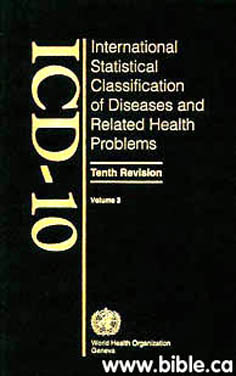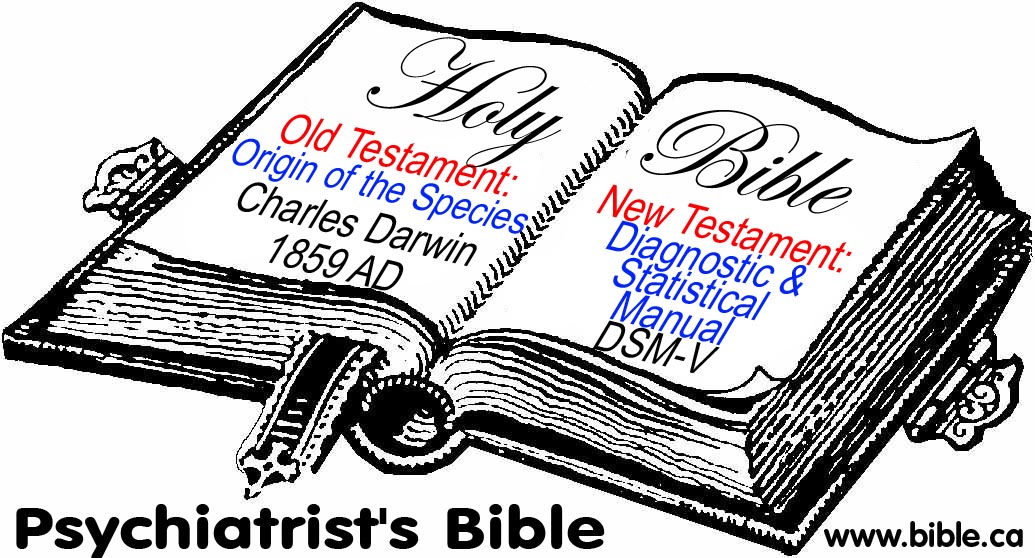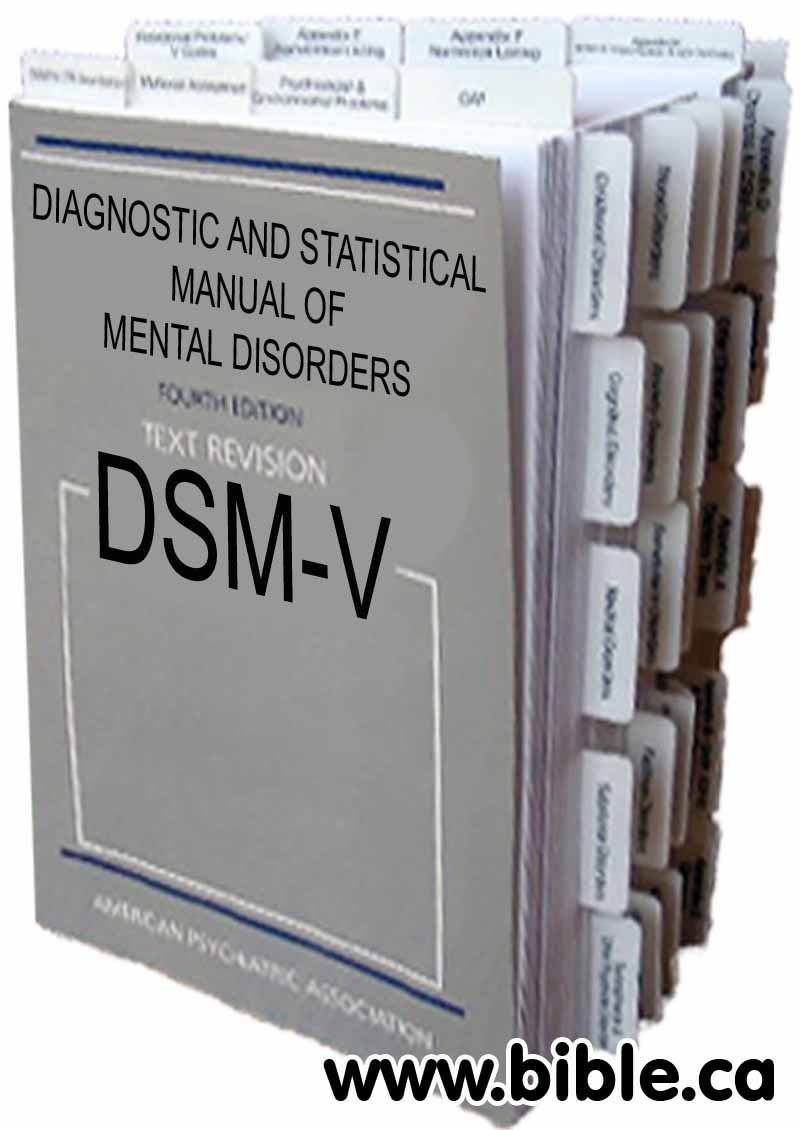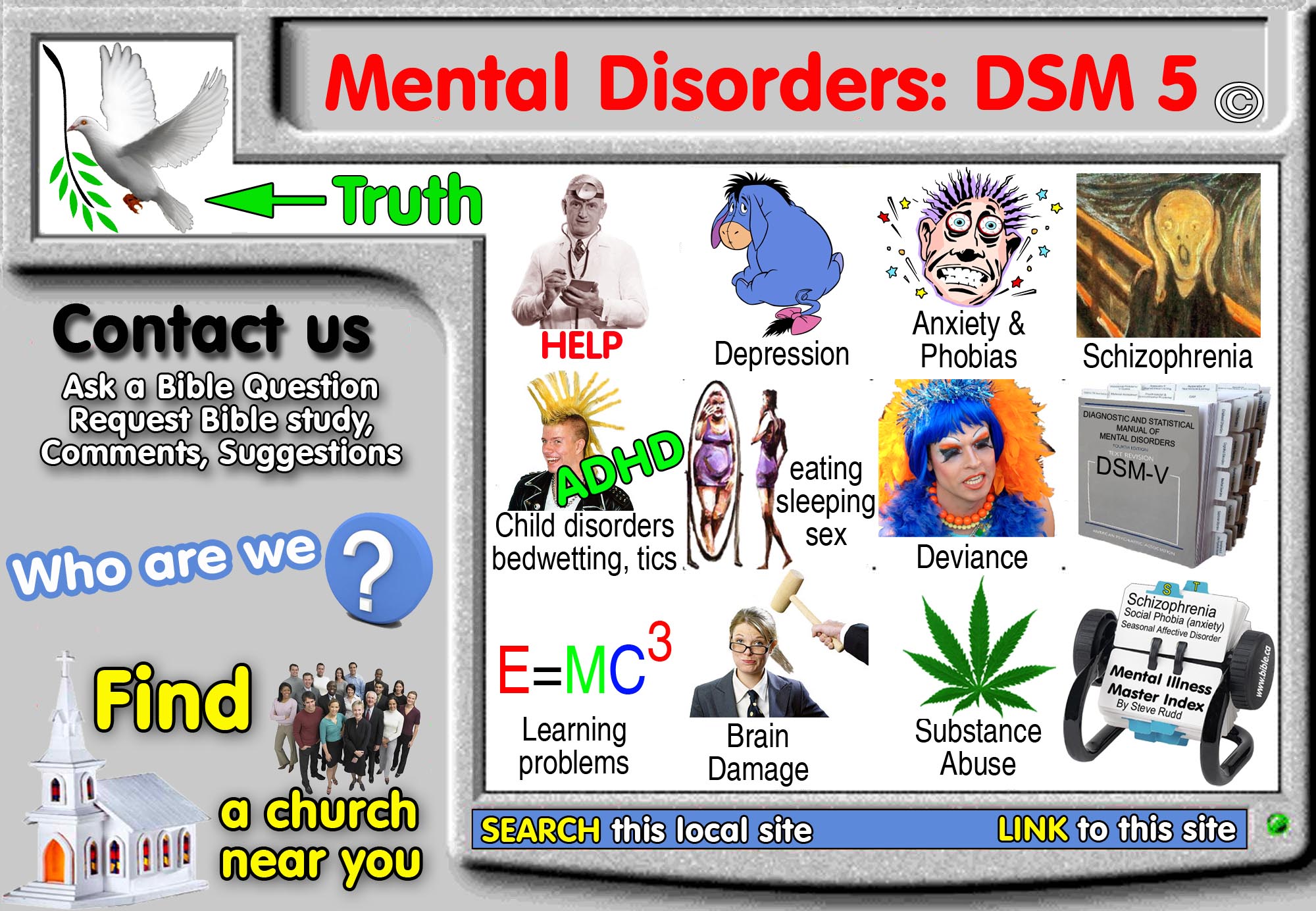DSM-IV, DSM-5, ICD-10: MASTER INDEX: F01-F99
The atheist's Bible and behaviour control manual
|
|
|
|
The 10 minute Video Challenge |
|
|
Mental illness is behaviour and not disease. Ritalin is poison not medication. (ADHD) (4 minutes) |
The DSM-5 is the Atheist's Moral Code, the psychiatrist's Bible. (6 minutes) |
|
|
|
Quick links:
1. The history of psychiatry is plagued with fad diagnoses that in hindsight did more harm than good. The new DSM-5 continues that tradition of medicalizing current fads and calling everyday normal behaviours and sins a disease.
a. NEW in DSM-5: "Rape" and "internet sex addiction" and are now mental disorders. Ladies, thank your psychiatrist for excusing your rapist on the basis he was mentally ill and suffered from a chemical imbalance in his brain that forced him to rape you involuntarily and beyond his ability to resist.
b. NEW in DSM-5: "Disruptive Mood Dysregulation Disorder" makes little Johnny's temper tantrum into a mental disorder.
c. NEW in DSM-5: "Major Depressive Disorder" now includes the grief experienced from death of a loved one or divorce.
d. NEW in DSM-5: "Minor Neurocognitive Disorder" makes the increases forgetfulness of the natural aging process a mental disorder.
e. NEW in DSM-5: Scientistic sounding labels to create the illusion that your behaviour is a medical problem and a disease.
2. "Thus, whereas in modern medicine new diseases were discovered, in modern psychiatry they were invented. Paresis was proved to be a disease; hysteria was declared to be one." (The Myth of Mental Illness, Thomas Szasz, 1961 AD, p12)
3. See also the DSM money crab: Diagnostic and Statistical Manual (DSM-5) is for billing purposes.
|
|
||
|
DSM-IV, DSM-5, ICD-10 International Classifications of Diseases Diagnostic and Statistical Manual |
||
|
DSM-5: Mental and behavioral disorders (F01-F99) |
|
|
"Draw near to God and He will draw near to you. Cleanse your hands, you sinners; and purify your hearts, you double-minded." James 4:8
"For this people's heart has become calloused; they hardly hear with their ears, and they have closed their eyes. Otherwise they might see with their eyes, hear with their ears, understand with their hearts and turn, and I would heal them. Acts 28:27 |
|
|
|
|
Biopsychiatric diagnosis names are scientistic sounding labels of everyday behaviour
|
Biopsychiatric diagnosis Labels My fellow Students... "I would like to teach you in 5 minutes everything you will ever need to know about being a psychologist. As a young woman your age, and a married stay at home mom, I have been using all these therapeutic methods on my six year old son for years! But the professor won't tell you that until year four!" Read the story: scientistic sounding labels |
Biopsychiatric definitions of mental disorders are fuzzy and imprecise:
1. "In studying human behavior, we face the disconcerting fact that psychiatric theories are nearly as numerous and varied as psychiatric symptoms. … Actually, contemporary psychiatry is characterized by a multitude of diverse, competing, and often mutually exclusive beliefs and practices." (The Myth of Mental Illness, Thomas Szasz, 1961 AD, p94)
2. "Definition of a Mental Disorder: Although DSM-IV-TR provides a classification of what are called mental disorders, it must be admitted that no available definition adequately specifies precise boundaries for the concept mental disorder." (DSM-IV-TR Guidebook, 2004 AD, p 12)
3. "A practical definition of mental disorders and medical conditions that is often implicitly used is "that which clinicians treat." Of course, this is tautological and could even be used in a self-serving or turf-defending way, but other more abstract concepts consistently fail to provide greater explanatory power." (DSM-IV-TR Guidebook, 2004 AD, p13)
4. "Nosology: Categorical Versus Dimensional Diagnosis: In summary, psychiatric disorders are neither homogeneous nor divided by clear boundaries. The two most important issues to understand in using DSM-IV-TR are that 1) there is considerable heterogeneity of the presentations encountered even within each disorder, and 2) the boundaries between disorders are often fuzzy; many patients have presentations that fall through the cracks and cannot be comfortably forced into any of the DSM-IV-TR categories." (DSM-IV-TR Guidebook, 2004 AD, p 17)
5. "In other words, physicians are trained to treat bodily ills—not economic, moral, racial, religious, or political "ills." And they themselves (except psychiatrists) expect, and in turn are expected by their patients, to treat bodily diseases, not envy and rage, fear and folly, poverty and stupidity, and all the other miseries that beset man. Strictly speaking, then, disease or illness can affect , only the body. Hence, there can be no such thing as mental illness. The term "mental illness" is a metaphor." (The Myth of Mental Illness, Thomas Szasz, 1961 AD, pix)
6. "Bodily illness stands in the same relation to mental illness as a defective television set stands to a bad television program. Of course, the word "sick" is often used metaphorically. We call jokes "sick," economies "sick," sometimes even the whole world "sick"; but only when we call minds "sick" do we systematically mistake and strategically misinterpret metaphor for fact—and send for the doctor to "cure" the "illness." It is as if a television viewer were to send for a television repairman because he dislikes the program he sees on the screen?" (The Myth of Mental Illness, Thomas Szasz, 1961 AD, pxi)
|
Biopsychiatric Behaviour Label |
Case Studies |
|
Alcoholics Anonymous (AA) |
|
|
Attention-Deficit (ADHD) |
|
|
Bipolar Disorder (BPD) |
|
|
Eating disorders: Anorexia, bulimia |
|
|
Multiple
Personality Disorder (MPD) |
|
|
Panic Disorder (PD) |
|
|
Postpartum Depression (PPD) |
|
|
|
|
|
Schizophrenia, Delusion |
Applesauce, Faint, Abba, Operator, Barefoot, Dogs, Kitten, Zombie, Wolfhound, Cobbler, Socrates, Moonchild, Soup, Hercules, Headless, Lovesick, Subterranean, Brimstone, Waterfall, Saul |
|
Tourette's Syndrome (TS) |
|
|
Shampoo, Hooky, Sponge, Crutches, Deferred, Bedridden, Mouse, Amnon |
|
|
Social Phobia (SP) |
|
|
|
|
By Steve Rudd: Contact the author for comments, input or corrections.
Send us your story about your experience with modern Psychiatry





